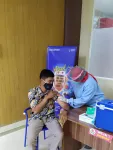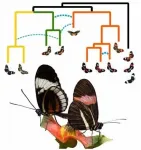Add fatty acid to taste
New technology reveals single cancer cells have different appetites for fatty acids
2021-07-16
(Press-News.org) A new method developed by Institute for Systems Biology (ISB) and University of California, Riverside provides new insights into cancer biology by allowing researchers to show how fatty acids are absorbed by single cells.
Fatty acids, along with glucose and amino acids, are a major energy source for cellular growth and proliferation, and abnormal fatty acid metabolism is often seen in cancer. Dr. Wei Wei's lab at ISB and Dr. Min Xue's lab at UC Riverside have been collaborating for years to develop a series of chemical probes and analytical approaches for quantifying cellular glucose uptake, lactate production, amino acid uptake, and other cancer-related metabolites.
Unlike glucose and amino acids, however, the mechanisms underlying the uptake of fatty acids into cells have been lesser known and difficult to discern. The technical tools for measuring fatty acid uptake at the single-cell level are extremely limited.
"This work is the first example of profiling fatty acid uptake in conjunction with aberrant protein signaling in cancer cells at single-cell resolution and represents an important advance in the single-cell metabolic assay," said ISB Assistant Professor Dr. Wei Wei, co-corresponding author of a just-published paper in the Journal of the American Chemical Society.
To profile the fatty acid uptake, the researchers chose a surrogate molecule that was structurally similar to natural fatty acids. This similarity tricked the cells into taking up these surrogates like the native ones. Then, using a unique dendrimer molecule - a tree-like polymer - the researchers achieved precise quantitation of those surrogates from single cells.
Applying this new single-cell tool to a brain cancer model, the researchers identified that fatty acid uptake was differentially regulated by two downstream effectors of the Mammalian Target of Rapamycin (mTOR) - a critical regulator of cell proliferation and protein synthesis. The results revealed a compensatory activation of fatty acid metabolism upon oncogene inhibition or attenuation of glucose metabolism in these brain cancer cells and uncovered a novel combination therapy that targets this bioenergetic flexibility to synergistically block the tumor growth.
"This novel tool opens new avenues for studying how fatty acid metabolism affects biological systems. It has also inspired us to develop more metabolic probes for single-cell analysis," said UC Riverside Assistant Professor Dr. Min Xue, co-corresponding author on the paper.
INFORMATION:
Drs. Zhili Guo (UCR) and Hanjun Cheng (ISB) are the co-first authors of this paper. This work is funded by the National Cancer Institute and Andy Hill CARE Fund.
About ISB
Institute for Systems Biology (ISB) is a collaborative and cross-disciplinary non-profit biomedical research organization based in Seattle. We focus on some of the most pressing issues in human health, including aging, brain health, cancer, COVID-19, sepsis, as well as many infectious diseases. Our science is translational, and we champion sound scientific research that results in real-world clinical impacts. ISB is an affiliate of Providence, one of the largest not-for-profit health care systems in the United States. Follow us online at http://www.isbscience.org, and on Facebook, LinkedIn and Twitter.
ELSE PRESS RELEASES FROM THIS DATE:
2021-07-16
Climate change is driving a large increase in intense, slow-moving storms, a new study by Newcastle University and the Met Office has found.
Investigating how climate affects intense rainstorms across Europe, climate experts have shown there will be a significant future increase in the occurrence of slow-moving intense rainstorms. The scientists estimate that these slow-moving storms may be 14 times more frequent across land by the end of the century. It is these slow-moving storms that have the potential for very high precipitation accumulations, ...
2021-07-16
New research published in Nature Medicine reveals willingness to get a COVID-19 vaccine was considerably higher in developing countries (80% of respondents) than in the United States (65%) and Russia (30%).
The study provides one of the first insights into vaccine acceptance and hesitancy in a broad selection of low- and-middle income countries (LMIC), covering over 20,000 survey respondents and bringing together researchers from over 30 institutions including the International Growth Centre (IGC), Innovations for Poverty Action (IPA), WZB Berlin Social Science Center, the Yale Institute for Global Health, the Yale Research Initiative on Innovation and Scale (Y-RISE), ...
2021-07-16
Engineers at UC Riverside have unveiled an air-powered computer memory that can be used to control soft robots. The innovation overcomes one of the biggest obstacles to advancing soft robotics: the fundamental mismatch between pneumatics and electronics. The work is published in the open-access journal, PLOS One.
Pneumatic soft robots use pressurized air to move soft, rubbery limbs and grippers and are superior to traditional rigid robots for performing delicate tasks. They are also safer for humans to be around. Baymax, the healthcare companion robot in the 2014 animated Disney film, Big Hero 6, is a pneumatic robot for good reason.
But existing systems for controlling pneumatic soft robots still use electronic valves ...
2021-07-16
Imagine an orange cat. Now, imagine the same cat, but with coal-black fur. Now, imagine the cat strutting along the Great Wall of China. Doing this, a quick series of neuron activations in your brain will come up with variations of the picture presented, based on your previous knowledge of the world.
In other words, as humans, it's easy to envision an object with different attributes. But, despite advances in deep neural networks that match or surpass human performance in certain tasks, computers still struggle with the very human skill of "imagination."
Now, a USC ...
2021-07-16
BUFFALO, N.Y. - Many legacy media outlets played an unwitting role in the growth of the four most successful fake Twitter accounts hosted by the Russian Internet Research Agency (IRA) that were created to spread disinformation during the 2016 U.S. presidential campaign, according to a study led by a University at Buffalo communication researcher.
In roughly two years beginning in late 2015, these accounts went from obscurity to microcelebrity status, growing from about 100 to more than 100,000 followers. With its heavily populated follower base ready to spread the word -- like all heavily engaged Twitter audiences -- the IRA could strategically deploy messages and provide visible metrics, creating an illusion of authority and ...
2021-07-16
As the Covid-19 pandemic raged, news reports show that sales of electronic air cleaners have surged due to concerns about airborne disease transmission. But a research team at the Georgia Institute of Technology has found that the benefits to indoor air quality of one type of purifying system can be offset by the generation of other pollutants that are harmful to health.
Led by Associate Professor Nga Lee "Sally" Ng in Georgia Tech's School of Chemical and Biomolecular Engineering and the School of Earth and Atmospheric Sciences, the team evaluated the effect of a hydroxyl radical generator in an office setting. Hydroxyl radicals react with odors and pollutants, decomposing ...
2021-07-16
A team of researchers from the University of Maryland has 3D printed a soft robotic hand that is agile enough to play Nintendo's Super Mario Bros. - and win!
The feat, highlighted on the front cover of the latest issue of Science Advances, demonstrates a promising innovation in the field of soft robotics, which centers on creating new types of flexible, inflatable robots that are powered using water or air rather than electricity. The inherent safety and adaptability of soft robots has sparked interest in their use for applications like prosthetics and biomedical devices. Unfortunately, controlling the fluids that make these soft ...
2021-07-16
Evolution is often portrayed as a tree, with new species branching off from existing lineages, never again to meet. The truth however is often much messier. In the case of adaptive radiation, in which species diversify rapidly to fill different ecological niches, it can be difficult to resolve relationships, and the phylogeny (i.e. evolutionary tree) may look more like a bush than a tree. This is because lineages may continue to interbreed as new species are established, and/or they may diverge and then re-hybridize, resulting in genetically mixed populations (known as admixture). Even after species diverge, the introduction of genes from one species to another (known as introgression) can occur. All of ...
2021-07-16
A UC San Francisco study has found that the antibiotic azithromycin was no more effective than a placebo in preventing symptoms of COVID-19 among non-hospitalized patients, and may increase their chance of hospitalization, despite widespread prescription of the antibiotic for the disease.
"These findings do not support the routine use of azithromycin for outpatient SARS-CoV-2 infection," said lead author Catherine E. Oldenburg, ScD, MPH, an assistant professor with the UCSF Proctor Foundation. SARS-CoV-2 is the virus that causes COVID-19.
Azithromycin, a broad-spectrum antibiotic, is widely prescribed as a treatment for COVID-19 in the United States and the rest of the world. "The hypothesis is that it has anti-inflammatory properties that ...
2021-07-16
ATLANTA--An oral prodrug developed by a team of scientists led by Binghe Wang, Regents' Professor of Chemistry at Georgia State University, delivers carbon monoxide to protect against acute kidney injury, according to a new paper published in Chemical Science.
Although carbon monoxide (CO) gas is toxic in large doses, scientists have discovered it can have beneficial effects by reducing inflammation and protecting cells against injury. Previous studies have demonstrated the protective effects of CO against injury in the kidneys, lungs, gastrointestinal tract and liver, among other organs. For the past five years, Wang and his collaborators have worked to design a safe way to deliver CO to human patients via prodrugs -- inactive compounds that ...
LAST 30 PRESS RELEASES:
[Press-News.org] Add fatty acid to taste
New technology reveals single cancer cells have different appetites for fatty acids



